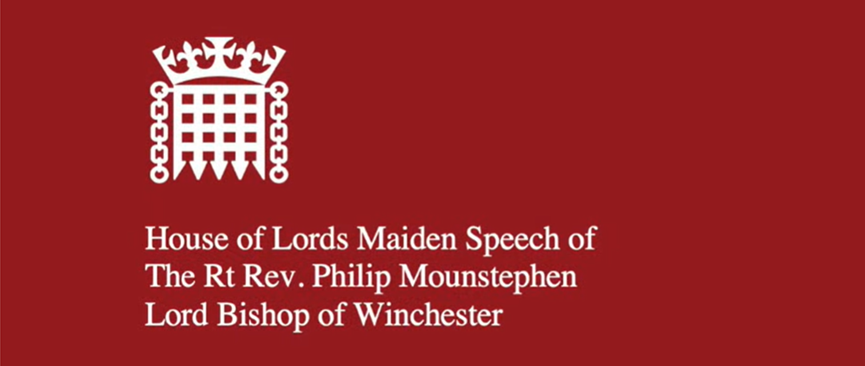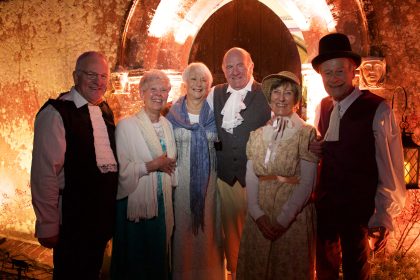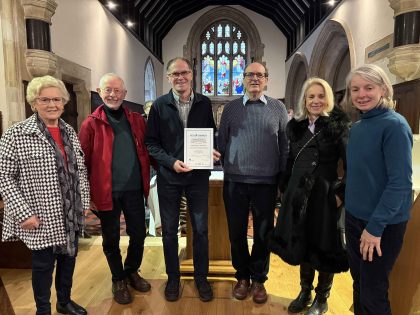The Rt Reverend Philip Mounstephen, Bishop of Winchester, delivered his Maiden Speech on 11th January in a debate on the UK’s contribution to international development, particularly in relation to the impact of climate change on developing nations. Bishop Philip spoke on the importance of holding globalism with localism and the importance of tackling Freedom of Religious Belief and climate change together.
Transcript
My Lords, I am conscious of the immense privilege and responsibility that is mine to have a seat, as of right, in your Lordships’ House and am very grateful for the welcome and help I have received from Noble Lords and staff of the House as I have been inducted into the ways of this place.
The See of Winchester, which I now serve, was founded in the year 660, and in the year 838 at the Great Council of Kingston, King Ecgberht of Wessex entered into a compact with the sees of Winchester and Canterbury in return for their promise of support for his son’s Æthelwulf’s claim to the throne.
That ancient compact was a key moment in the developing relationship between Church and State that has done so much to shape the life of this country, as, together, we have sought the common good: and it is to that theme of the common good that I will return later.
But to turn specifically to the matter of this debate, in looking at this issue of international development I believe we must pay proper attention to two cardinal principles: those of internationalism and localism.
It is vital that, as a country, we take an internationalist approach to international development: global problems, including the problem of climate change, require global solutions, and nothing less than global solutions will do.
But in all that, the distinctiveness of the local must not be lost. Rather it must be valued. Effective development must always have purchase at the grass roots, in specific contexts and communities, or it will be simply unsustainable.
In my clerical career, I have been immensely privileged both to have been given a broad international perspective and unique insights into the local and particular. I have led a church in a small, rather unremarked, but nonetheless wonderful corner of south London, and led another at the heart of the city of Paris, exercising ministry at the crossroads of the world.
I have worked as a consultant with churches across the UK and Ireland in radically different contexts, and I have led a global mission agency deeply committed to pursuing a global agenda through the context of the very local and the particular. I have been Bishop of Truro, in Cornwall, a place with great historic international reach, and its own very distinctive and much prized local culture. And I serve now in Winchester, a diocese with extensive global links across the Anglican Communion and a place which can lay good claim to have shaped the wider world – think for example of Bishop Lancelot Andrewes overseeing the compilation of the Authorised Version of the Bible and its global impact. But it is a place too which is made up of truly distinctive local places: the great port city of Southampton; the burgeoning boroughs of Basingstoke, Bournemouth and Christchurch; our historic market towns of Andover, Alton, Alresford and Romsey; innumerable picture-perfect Hampshire villages; the South Downs and the New Forest: each a place of value in its own right, but part too of a greater whole.
This theme of globalism and localism, and paying proper attention to both, has particular relevance when we look at one theme critical to international development, and that is the issue of Freedom of Religion or Belief, or ‘FoRB’ for short: an issue of great significance for this debate, because the denial of FoRB is inimical to effective community development. As Bishop of Truro, at the invitation of the then Foreign Secretary, the member for Southwest Surrey, the Rt Hon Jeremy Hunt MP, I authored a report, the recommendations of which became, and remain, government policy. And I’m also hugely grateful to my friend in the other place, the member for Congleton, Fiona Bruce MP, who holds the role of the Prime Minister’s Special Envoy for FoRB, for her dogged commitment to the implementation of those recommendations – recommendations which have even led to the passing, for the first time ever, of a UN Security Council resolution on this issue. And I do hope efforts in the other place to make the role of Special Envoy permanent are successful for that was also one of my recommendations.
In this global struggle for FoRB, in which the UK plays a leading role, we value both the international – this is a universal right and a global problem – and the local, in that it is minority communities which are most under threat from its denial.
The denial of FoRB is a scourge on local minority communities and, therefore, on their development. And its denial can be laid squarely at the feet both of weak government and of intolerant, authoritarian, nationalistic regimes who brook no dissent, some of whom seek global hegemony. This is, therefore, a growing global problem that requires a global response – and I am honoured to play my part along with many others, including the noble Baroness, Baroness Cox, and the noble Lord, Lord Alton of Liverpool, in such a response. It is vital that we act globally to protect the distinctive and the local; the minority and the particular.
And there is a moral connection between the global struggle for FoRB, and the challenge of climate change. In the end , only plural states with a heart for the common global good, rather than their own self-aggrandizement, are going to truly care about both these issues. Put bluntly, I doubt either Kim Jong-Un or the Taliban are that concerned about climate change – and they certainly don’t care about FoRB. But action on FoRB and action on climate change spring from a common concern for the common good. In tackling both we seek the health and welfare of the whole planet and of all humanity: a common good which in the end can only be expressed through flourishing local contexts and communities.
Promoting FoRB promotes plural, prosperous, stable states – so in promoting FoRB the UK is certainly contributing to international development and to global security.
In tackling climate change and FoRB together, we must stand against those regimes that are more concerned with preserving their own power than seeking the local rights of minorities and the global good of the whole planet.
So my Lords, I do urge His Majesty’s Government and us, as a country, to maintain both a broad international perspective – because global problems require global solutions – and to value and treasure and preserve the local and the particular: those things which make this world so rich – and indeed so blessed – a place.




